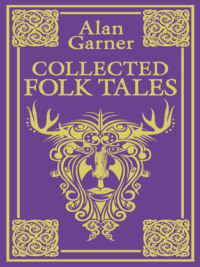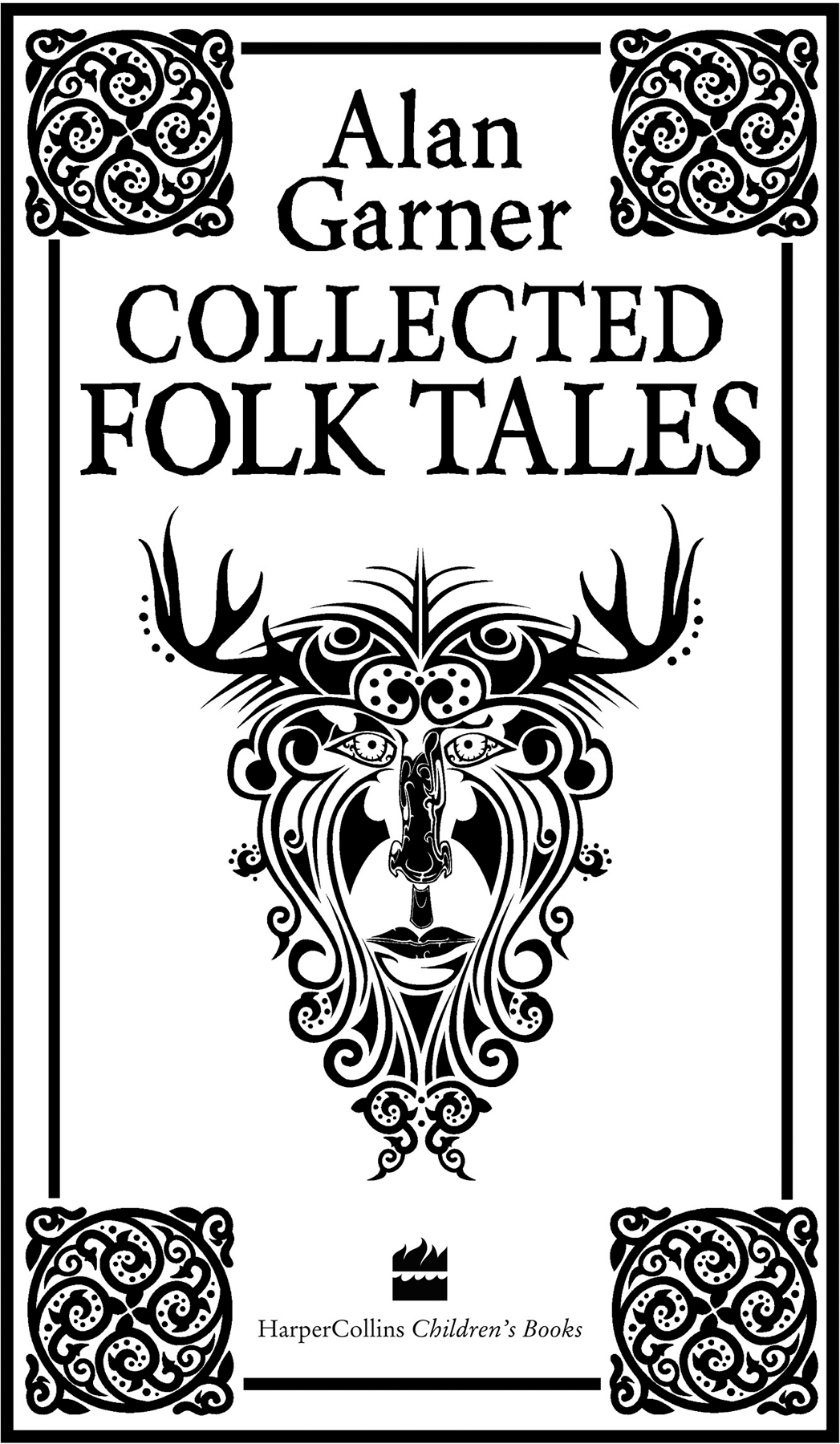
Collected Folk Tales


Dedication
For Sam
Contents
Title Page
Dedication
Prayer
Introduction
Gobbleknoll
Shick-Shack
Vukub-Cakix
Tops or Bottoms
The Voyage of Maelduin
The Fort of Rathangan
Willow
Maggoty’s Wood
Edward Frank and the Friendly Cow
Yallery Brown
Moowis
The Lady of the Wood
A Voice Speaks from the Well
Bash Tchelik
Iram, Biram
The Goblin Spider
To the Tengu Goblins and other Demons
The Secret Commonwealth
The Piper of Shacklow
The Adventures of Nera
The Green Mound
A Letter
Halloween
Great Head and the Ten Brothers
Faithful John
The Trade that No One Knows
Jack and his Golden Snuff-Box
A Charm against Witches
Tarn Wethelan
Mist
Asrai
Hoichi the Earless
The Breadhorse
Ramayana
The Island of the Strong Door
The Smoker
R. I. P.
Wild Worms and Swooning Shadows
Assipattle and the Mester Stoorworm
The Barguest of Nidderdale
Loki
Baldur the Bright
The Flying Childer
Father, Wait for Me
Glooskap
The Wonderful Wood
Wae’s Me
The Green Mist
Other Books by Alan Garner
Copyright
About the Publisher
Prayer
Graunt that no Hobgoblins fright me,
No hungrie devils rise up and bite me;
No Urchins, Elves, or drunkards Ghoasts
Shove me against walles or postes.
O graunt I may no black thing touch.
Though many men love to meet such.
John Day
1604
Introduction
“Believe the fairy tales. What were the fairy tales, they will come true.”
That is a common beginning to Russian stories, and it is a wise one. We have always tried to make sense of the natural forces in the world and of the hidden forces in ourselves. Sometimes we give them shapes as gods and devils and spirits; sometimes we make them into animals; sometimes we subject them to rules, which we call magic. And I would call much of magic “the science we have not discovered yet”.
Four hundred years ago, a man could write in England: “Our mothers maids have so terrified us with an ouglie divell having hornes on his head, fier in his mouth, and a taile in his breache, eies like a bason, fanges like a dog, claws like a beare, and a voice roring like a lion, whereby we start and are afraid when we hear one cry Bough; and they have so fraied us with bull beggers, spirits, witches, urchins, elves, hags, fairies, satyrs, pans, faunes, syleens, kit with the cansticke, tritons, centaures, dwarfes, giants, imps, calcars, conjurers, nymphes, changelings, Incubus, Robin good-fellowe, the spoorne, the mare, the man in the oke, the hell waine, the firedrake, the puckle, Tom thombe, hob goblin, Tom tumbler, boneles, and such other bugs, that we are afraid of our own shadows.”
Little has changed since then. We may have lost our faith in the terror of the cornfield and the greenwood, but we still need terror. Boneles and such other bugs now ride flying saucers, and it is in the galaxy, not the churchyard, that menace lies.
We need to be scared. It is healthy and good for us. But not all traditional stories are about confronting fear. They can show us our humanity and convey a sense of the numinous.
Traditional stories may be myth, legend, fairy tale or folk tale. Each of these terms has a different and technical meaning; but this book is not technical. It is for anyone that loves a story, whether the story be anecdote or epic.
I believe that story is, at root, universal; though it changes with, and benefits from, its cultural trappings. To test this I have taken some stories out of their context and put them into the words of my own family, especially into the words of my grandfather, Joseph Garner, who was a smith. In a village the glow of the dark smithy is, or was, a place of mystery, a boundary between worlds. What was spoken round the anvil was not spoken in the street. So, having selected and compared written texts, I took some of them back to my childhood and said: Please, Grandad, tell me this story. And I listened, and wrote what he told me. I did it for more than one reason.
Folk tales once belonged to everyone, though not everyone was qualified to tell them, and it is a comparatively recent assumption that they are for children only.
In this selection I have tried to get back, through the written word, a sense of the spoken. These stories, even the most formal, are to be heard as well as seen.
During the seventeenth and eighteenth centuries, in Britain, traditional stories of the fantastic and the supernatural came under attack: directly from the Church, for being either lies or the work of the Devil; indirectly from the educated and the literate, who followed the new sceptical materialism; and incidentally from the growth of towns and cities, which obliterated the oral traditions that a settled rural community may sustain, but an urban society of strangers does not. The result was, by the middle of the nineteenth century, that stories that have existed in all times and in all places, as the common property of all, had been removed from their tellers and their audience and delivered up to child-minders and to scholars.
In the nursery, printed folk tales became tracts to support authority, with moral lessons inserted and the wilder elements tamed so that children should not be exposed to unseemly events. And in the academic world, the duty of the folklorist was to rescue and record the stories that had survived, without concern for a popular audience. On the one hand, the texts were made literary and trite; and on the other, remote and unattractive, since the accurate transcription of spoken words carries with it little of the performance, in which the vitality lies.
By nature, folk tale addresses itself to the ear rather than to the eye. Its first appeal is to a listener, and, since a listener is unable to stop and consider as a reader may, the form of the tale is direct. Plot evolves through physical action, and other concerns are kept in the listener’s head by repetition. When literary styles, based on reason, try to make sense of folk tale, they render it mundane. The real meaning is in the music; it is in the language: not phonetics, grammar or syntax, but pitch and cadence, and the colour of the word.
In this selection I have tried to get back, through the written word, a sense of the spoken. I have worked to recreate the moment of the telling, so that the printed word may sing.
Alan Garner


So the Rabbit went to the hill, and shouted, “Gobbleknoll, swallow me! Come, devour me!”
But Gobbleknoll knew the Rabbit, and took no notice.
Later that day, a group of travellers came by, looking for a place to shelter from the rain, and Gobbleknoll opened his green and ferny lips, and the travellers thought that they had found a cave. They went in, and the Rabbit slipped close behind them. But the hill felt hairy pads on his tunnels, and before the Rabbit could reach the middle, Gobbleknoll threw him out, and the grass shut.
The Rabbit went and hid behind a tree, and a few days later a hunting party arrived at the hill just before night, and Gobbleknoll opened again. This time the Rabbit used magic art, and took the shape of a man, except for his ears, which he tucked down his shirt, so that they would not brush against the roof and make Gobbleknoll sneeze.
He went down long and horrid passages, until he came to the hill’s stomach, and there were the remains of all the victims, and some who were not yet dead.
“Hey hey hey!” shouted the Rabbit. “Why don’t you eat? You leave the best! Here’s a delicious heart. What’s wrong with that?”
Gobbleknoll set up a dismal howling, for it was his own heart that the Rabbit had seen. And the Rabbit knew this, and took out a knife, and stabbed the hill dead. The ground split, and the blue sky lit the deep hollows, and the living came out and wept before the Rabbit, and wanted to give him power and riches. But all the Rabbit would take was Gobbleknoll’s fat, and he went home with it on his back, and he and his grandmother were fit to burst from it for many a day.


One day, the fox said that he would go hunting.
“Then go to the hill,” said Shick-Shack. “Do not go to the lake.”
Well, the fox was away all that day, and at night he did not come home. And the next day, too, he did not come back.
“That fox,” said Shick-Shack, “has gone to the lake. And now I shall have to find him.”
So Shick-Shack went to the lake to look for the fox, but all he could see was a brown bird on a branch over the water.
“Brown bird,” said Shick-Shack, “why are you sitting there and staring down so at the water?”
The brown bird said nothing.
“Brown bird,” said Shick-Shack, “why won’t you speak?”
The brown bird said nothing.
“Brown bird,” said Shick-Shack, “if you’ll tell me why you are staring down so at the water, I’ll paint you with bright colours.”
“If you’ll paint me with bright colours,” said the brown bird, “I’ll tell you why I’m staring down so at the water.”
“Well, I’ll do that,” said Shick-Shack. And he painted the brown bird with bright colours.
Then the bird said, “The truth of why I’m staring down so at the water is that a fox came here the day before now; and the snake that lives in the lake has eaten the fox, and is down there, sleeping.”
“Hah,” said Shick-Shack. And he sat on the shore of the lake, and turned himself into a tree stump.
By and by, the snake came out of the water. And when it saw the stump, it said, “That’s no tree stump.” And the snake wound all its lubber length about the stump, and squeezed. The stump split, and said nothing.
“It is like a stump,” said the snake, “but it is Shick-Shack.”
Just then, a dog came along, and the snake said, “Dog, bite that stump with your teeth.” So the dog bit the stump with its teeth. And the stump said nothing.
“It is like a stump,” said the dog, and went away.
Next, a bear came along.
“Bear,” said the snake, “rip that stump with your claws.”
So the bear ripped the stump with its claws. And the stump said nothing.
“It is like a stump,” said the bear, and went away.
“It is a stump,” said the snake. “It is not Shick-Shack.” And it lay down on the shore, and went back to sleep.
The next thing was that Shick-Shack turned back from a stump into himself, and he throttled that snake, and threw it into the lake.
Now the water didn’t like that, and it came up out of the lake to drown Shick-Shack.
Shick-Shack ran, and the water came after. He ran to the hill, and ran up it. He ran to the top. The water came after. There was a tree at the top of the hill, and Shick-Shack climbed it. The water came after. Shick-Shack climbed to the top of the tree. The water came after.
Shick-Shack said to the tree, “Grow.” The tree grew. The water came after.
Shick-Shack said to the tree, “Grow.” The tree grew. The water came after.
Shick-Shack said to the tree, “Grow.” The tree grew. The water came after.
Shick-Shack said to the tree, “Grow.” The tree said, “I’ve done with growing.”
The water came after. Shick-Shack broke branches from the tree to make a raft, and he sat on the raft and floated over the water.
Shick-Shack saw an otter swimming by, and he said to the otter, “Have you seen any land?”
“No, I haven’t,” said the otter.
“Go and find some,” said Shick-Shack.
So the otter swam down into the water, and when she came back she said, “There is none.”
Shick-Shack saw a rat swimming by, and he said to the rat, “Have you seen any land?”
“No, I haven’t,” said the rat.
“Go and find some,” said Shick-Shack.
So the rat swam down into the water, and when she came back she said, “There is none.”
“Show me your paw,” said Shick-Shack.
The rat showed him her paw. And there were three grains of sand in it.
Shick-Shack put the three grains of sand on the water, and took some ants from the branches of the raft, and he said to the ants, “Walk round that sand.”
So they did. And the sand grew.
“More,” said Shick-Shack. The ants walked round the sand. The sand grew. Shick-Shack said, “More.” The ants walked round the sand. The sand grew. Shick-Shack said, “More.” The ants walked round the sand. The sand grew. “Is that enough?” said Shick-Shack.
So he put a wolf and her cub out on the new land, and the cub ran; and it ran and it ran, till it was an old wolf, but it never did reach the end of the land.
“Hah,” said Shick-Shack.
Then Shick-Shack grew an oak tree, and he lived there, in the oak tree, on the new land. And he was so glad, he sang a little song:
“Within and out, in and out, round as a ball,
With hither and thither, as straight as a line,
With lily, germander, and sops in wine.
With sweet briar,
And bonfire,
And strawberry wire,
And columbine.”


Vukub-Cakix, the Great Macaw, was nothing but trouble. He shone with the brilliance of gold and silver, and his teeth were emeralds, and he owned the nanze-tree of succulent fruit. He was a boaster, and his sons were no better. Their names were Zipacna the Earthmaker and Cabrakan the Earthshaker. The sons made mountains and then toppled them, and the father guzzled the harvests, so that between them they were a plague in Guatemala.
One day Vukub-Cakix climbed his nanze-tree to eat the fruit, but the fruit had been eaten already. He swung in the tree-top, screaming his rage, but the rage turned to pain as a blow-pipe dart struck him on the jaw, and he lost his grip and tumbled to the ground. While he lay there, winded, Hun-Apu jumped on him out of a bush and began to strangle him. Vukub-Cakix would have died then if he had not seen the pulp of the nanze-fruit smeared round Hun-Apu’s mouth. This angered Vukub-Cakix more than his throttling, and he swelled into monster-fury and tore Hun-Apu’s arm from its shoulder.
Vukub-Cakix went home with the arm, still chattering vengeance, and he built a fire and put the arm on a spit to roast. Then he lay on his bed in a sulk and nursed his jaw.
Hun-Apu found his brother Xbalanque. “We must get my arm back,” he said, “before it’s cooked, or it will be stiff for life.” So they made their way as doctors to Vukub-Cakix’s house.
“We are famous doctors,” they said, “and from the noise we hear there must be somebody in need of us.”
“Aiee,” said Vukub-Cakix. “Aiee.”
“That sound I diagnose as a bad case of Grimgums,” said Xbalanque.
“Og, og,” moaned Vukub-Cakix.
“And that’s Eyetitis,” said Hun-Apu.
“They’ll have to come out,” said Xbalanque.
“Yes, all out,” said Hun-Apu.
“But shall I be cured?” said Vukub-Cakix.
“Cured?” said the twins. “Why, you’ll not recognise yourself.”
So they took out Vukub-Cakix’s teeth and put in grains of maize, but they gave him nothing for his eyes. And from that moment Vukub-Cakix was harmless. His colours faded, his mouth was no terror, and whether or not he died, or wandered in the forest as a beggar, no one knew or cared. Hun-Apu pulled his arm off the fire and stuck it back on his shoulder.
But the twins had not yet finished their work. Vukub’s two sons were still alive, and trouble enough without the need to avenge their father’s disaster. They decided to deal with Zipacna the Earthmaker first, and got four hundred young men to help them.
The young men pretended to be building a house. They cut down the biggest tree of Guatemala, and Zipacna found them heaving and straining to lift it.
“Oh, Sir,” they said, “please help us carry this tree. It is the ridge of our new house, which we are making as an offering to those two heroes, the sons of Vukub-Cakix.”
“Weaklings,” said Zipacna, and hefted the tree on to his shoulder.
“This way,” said the four hundred young men. “This way, if you please, Sir.”
The giant carried the tree through the forest to a clearing where the young men had dug a pit deeper even than the giant was tall.
“That is for the foundations, Sir,” they said. “Would you be so good as to take the tree down there?”
Zipacna jumped into the pit. “Foundations are a funny place for roof ridges, aren’t they?” he said. In answer, the young men piled logs and rocks on his head, and when the pit was a mound, they danced on it to celebrate the death of Zipacna.
But Zipacna was not dead. He was holding his strength, and when he felt that all the young men were above him on the mound, he burst upwards, the great mountainmaker, and his force sent the young men flying into the sky, where they have remained ever since as the Pleiades, waiting for someone to help them down.
Hun-Apu and Xbalanque had watched all this, and felt that they now had the measure of their enemy.
They made a ravine below a mountain range, and at the bottom of the ravine they carved an enormous crab out of stone, and painted it so that it seemed alive. Crabs were Zipacna’s favourite food. Then the twins spread the rumour that the biggest crab in the world was hiding in the ravine, and before long Zipacna came to investigate. When he saw the crab he swallowed it at a gulp.
“Good,” he said. “But heavy. No doubt I’ll be sorry.”
And he was. The twins diverted a river into the ravine, and Zipacna was too weighted to swim, and the twins pushed the whole range on top of him and shaped it into a single mountain over his head, so that Zipacna was both drowned and buried, and he lies under Mount Meahuan even now.
This left Cabrakan the Earthshaker.
The twins worked on him through his conceit.
They found Cabrakan throwing rocks about. He took no care for anything. If one flattened a village, it was just too bad.
“Good morning,” said Hun-Apu. “Would you tell us what you are doing?”
“Can’t you see?” said Cabrakan.
He lobbed a boulder into a maize crop.
“And who are you two?”
“We have no names,” said the twins. “We hunt with the blow-pipe, and since we never meet anyone, we need no names. But may we stay and watch you?”
“If you like,” said Cabrakan.
The twins sat and stared at Cabrakan with the unwinking eyes of children, and said nothing, nor showed themselves impressed by anything he did. Cabrakan tried all the harder to make these two hunters applaud, until after a week of mountain-hurling he was dizzy with hunger and fatigue.
Hun-Apu then shot a bird and baked it in clay for the giant, but the clay he used was poisoned, and when Cabrakan took up his work again he trembled as if with fever.
“Our father was a weak man,” said Xbalanque, “but he did all you have done. His favourite game was to throw that mountain over there into the sea.”
Cabrakan strove to focus his eyes through the sweat.
“What, that little white pimple of quartz?” he said. “That’s too small for me to bother with.”
“So you say,” said Hun-Apu.
“And so I’ll show,” said Cabrakan. He staggered to the hill and put his arms about it.
Now this hill was not like any other hill or mountain. It had no roots in the earth, but was a piece of the earth itself that showed through the land, an unbroken, shining rock that went on for ever beneath the giant’s feet.
So Cabrakan, exhausted by his efforts, poisoned by his enemies, took hold of the world and tried to lift it. His knees knocked like war-drums.
“We’ve been wasting our time,” said Xbalanque.
“I knew he couldn’t,” said Hun-Apu.
Cabrakan gave one great heave. The top of his head blew off. And that was the last of the race of Vukub-Cakix in Guatemala.

Brownie was a type of goblin that lived in and around the farmhouse. He would often work for the people on the farm, but he had an unpredictable temper, and sometimes, as in this story, he was much more trouble than he was worth.

Of course farmer will have none of that, so brownie makes a great to-do at night, and it’s half a day’s work regular to clear up after him around the house. Well, then farmer gives over leaving milk out in a saucer by the hearth; and so it goes from bad to worse.
Anyway, brownie must have the big field, he says, and they chunner and chunner, calling each other all the names, so as women have to cover their ears for language. Anyway, it’s left that farmer will do the work, and they’ll share the crop half and half between them.
When Spring comes, farmer says, “Which will you have, tops or bottoms?”
“Bottoms,” says brownie.
So farmer plants wheat, keeps the grain for himself, and gives brownie the roots and stubble.
Next year, farmer says to brownie, “Which will you have, tops or bottoms?”
“Tops,” says brownie.
So farmer plants turnips, and brownie is left to make what he can of the leaves.
He’ll have none of it the next year: not tops or bottoms: he will not. Corn, says brownie, that’s what it must be, and the field divided in half, and brownie and farmer to have a mowing match, winner keep all.
July next, farmer goes to the blacksmith and has ever so many thin iron rods made, and he plants them all over brownie’s half of the field.
Anyway, they start mowing at daybreak. Farmer walks through his patch, up and down, sweet as a comb, but brownie’s snagged like I don’t know what.
“Mortal hard docks, these: mortal hard docks,” he keeps clacking.
Anyway, after an hour of this the rods have knocked the edge from his scythe and it’s as blunt as a plough handle, and brownie is right borsant.